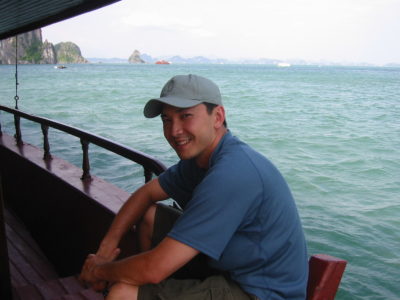Viet Thanh Nguyen is interviewed by Katherine Yungmee Kim for the USC College of Letters, Arts & Sciences Magazine. This interview was originally published in the Fall/September 2004 issue.

“If we look at Asian American history,” Viet Nguyen says, “it’s very difficult to isolate the ‘national’ from the ‘international.’ What the U.S. was doing in Asia, and what was happening within Asian politics and economies, impacted Asian Americans very much.”
Last spring, Nguyen—an associate professor of English and American studies and ethnicity at USC College and a 2002 Raubenheimer Junior Faculty Award recipient—spent his sabbatical leave in Saigon, where he worked on two projects. One is a collection of short stories, and the other is a critical project on the relationship between Vietnam and the United States.
“I am retooling myself as a scholar in an age of globalization,” Nguyen explains. “I never intended to do international or comparative work.” He says that when he was a graduate student at UC Berkeley, where he received his Ph.D. in English, he was purely focused upon Asian American claims to a national belonging.
Nguyen notes that the trip has impacted his academic work as an Americanist, and will undoubtedly enrich his classes at the College, where he teaches American literature and film, with a focus on race, nationality, class and gender.
The Personal and the Political

Nguyen was born in Vietnam and spent the early years of his childhood in Buon Me Thuot, a village known for its coffee. The town was also the first to be captured in the 1975 invasion of the south.
Nguyen’s parents—devout Vietnamese Catholic peasants—were doubly displaced. In 1954, as Vietnam was about to be divided along the 17th parallel, they had fled the north, fearing religious persecution and economic deprivation.
And then in 1975 when the south collapsed, Nguyen’s family fled Vietnam for the United States, leaving a hard-earned fortune as tailors, jewelers, auto dealers and merchants. Amidst the chaos, they were also separated from their adopted daughter.
This story, Nguyen informs, is not at all unusual in the Vietnamese American community, where the dissolution of families and the tragedies of war are commonplace conversations.
His extended family in Vietnam still relies upon his parents for remittances. “So,” he points out, “the history of division, dependence and inequality has been very important to me.”
Last spring marked his second visit to Vietnam. Two years ago, his first journey left him “dismayed tremendously by the poverty and the culture shock.” Because of his personal ties to the country, he felt his “unequal and unearned status as a rich tourist,” and he directly experienced the guilt of the dysfunctional relationship that the Antiguan writer Jamaica Kincaid describes “between tourists and natives because of the larger inequalities of globalization.”
He was forced to revisit issues ofidentity. “I had to ask myself yet again who I was,” he says. “Vietnamese, Vietnamese American, Asian American or American…What does it mean for me to take my western academic training and live in Vietnam?”
Prejudices and Preconceptions
During his sabbatical, he was skeptical of the Communist state, and questioned its limitations on free speech and economic progress. Part of those biases come from growing up in San Jose, California, in a virulently anti-communist Vietnamese American enclave.
“I wanted to see how the Vietnamese were living and grappling with various kinds of political, cultural and economic issues,” he claims. “I had many prejudices and preconceptions and I wanted to test them against what I saw.”
He has also come to question similar topics in America.
“I want to keep that comparative focus, acknowledging similarities without obliterating differences,” Nguyen states.
His research project will demonstrate how both nations grapple with parallel issues. One major focus will be the “historical memory” of the Vietnam War.
“Both states seem to actively want to suppress troublesome aspects of the past,” he comments.
His Writing
His main priority, he says, has been his fiction writing. He is currently working on a short story collection.
Nguyen’s first book, Race and Resistance: Literature and Politics in Asian America looked at how politics was dealt with in literature both as a series of events, such as internment, war and exclusion, and as a method of formal expression.
He also examined the political limitations of Asian American identity and culture. What came out of a radical movement in the ’60s has become “a middle-class identity and culture that does more to advance capitalism and globalization.”
He calls his work “basically pessimistic” but credits his recent foray into fiction for making him a better literary critic.
“Being able to write fiction makes a critic more sensitive to the challenges that writers face, and to the complexities of form. I have to think about how my theory of literature can actually be carried out in the writing of fiction.”
Nguyen asks himself how one writes a story about an outsider in Vietnam without objectifying the outsider or the natives. “This question of objectification recurs constantly in literature about Americans in Asia, or by Asian Americans writing about Asia.” “
It’s easy enough for me to criticize writers,” he admits. “But it’s very hard for me to actually do what they do.”
Nguyen also studied the Vietnamese language at Vietnam National University, the most competitive public university in Saigon. He met up with his long-lost sister in June and spent the rest of the summer continuing his studies and conducting research interviews. In the fall, Nguyen will begin a year-long fiction writing fellowship from the Fine Arts Work Center in Provincetown, Massachusetts.


